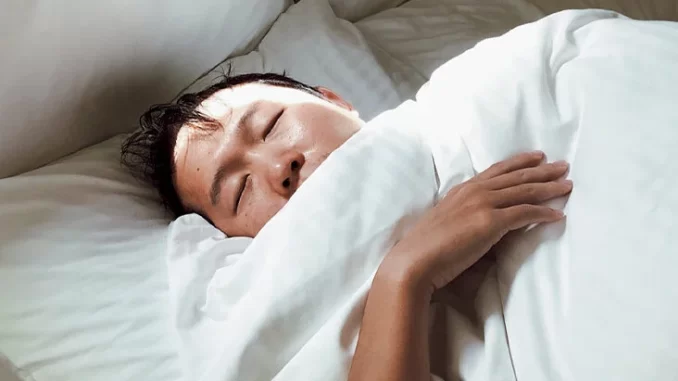
Night sweats, also known as sleep hyperhidrosis, are a common and often distressing symptom that can affect men. While many people may occasionally experience night sweats due to a warm sleeping environment or heavy blankets, true night sweats are excessive and persistent sweating during sleep that is not related to ambient temperature or bedding. There are various underlying causes and treatments for night sweats in men. This article will explore some of the most common causes, along with their respective treatments, to help men better understand and manage this uncomfortable condition.
1. Stress and Anxiety
Stress and anxiety can be common causes of night sweats in men. A 2012 systematic review found that both short-term and long-term anxiety can cause sweat glands to be more responsive, leading to night sweats. Going to bed with an anxious or stressed mind can overstimulate the brain, resulting in night sweats.
How to Treat Stress and Anxiety-Related Night Sweats
If the night sweats are due to acute stress, they may resolve once the stressor is removed. However, for chronic anxiety and night sweats, it is advisable to consult a doctor to assess the possibility of generalized anxiety disorder. Treatment for anxiety-related night sweats may involve relaxation techniques, therapy, and medications.
2. Medication Side Effects
Certain medications or classes of medications may affect sweat glands and body temperature, leading to night sweats. Common examples include high blood pressure medications, antiretroviral medications (HIV medications), and antidepressants.
How to Treat Medication-Induced Night Sweats
If you suspect that your medication is causing night sweats, consult your doctor about adjusting the dosage or switching to a different medication. It is crucial to speak with your doctor before stopping or reducing the dose of any prescribed medication.
3. Obstructive Sleep Apnea
Obstructive sleep apnea (OSA) is a sleep disorder that can cause night sweats in men. OSA causes episodes of paused breathing during sleep, which can raise cortisol levels in the body. This stress hormone can give the body the sensation of working out, even during sleep, resulting in night sweats.
How to Treat Sleep Apnea-Related Night Sweats
If you suspect you have OSA, consult a sleep specialist for a diagnosis. Treatment for OSA may include lifestyle changes, such as losing weight and avoiding alcohol, as well as using a continuous positive airway pressure (CPAP) machine during sleep.
4. Hyperhidrosis
Hyperhidrosis is a condition characterized by overactive nerves controlling sweat glands, causing excessive sweating. This condition affects about 15 million Americans and can result in excessive sweating during the day and at night.
How to Treat Hyperhidrosis-Related Night Sweats
Treatment for hyperhidrosis varies depending on the underlying cause and may include oral or topical medications, botulinum toxin injections, and surgery. Consult your doctor to determine the appropriate treatment for your condition.
5. Low Testosterone Levels
Low testosterone levels, also known as male hypogonadism, can cause night sweats in men. Testosterone levels gradually decline as men age, and sometimes the body may develop symptoms such as night sweats.
How to Treat Low Testosterone-Related Night Sweats
If a blood test confirms low testosterone levels, your doctor may prescribe testosterone replacement therapy in the form of injections, topical gels, or patches.
6. Hyperthyroidism
Hyperthyroidism is a condition where the thyroid is overactive, causing excessive sweating during the night. Other symptoms of hyperthyroidism include rapid heartbeat, weight loss, trouble sleeping, anxiety, irritability, and tremors.
How to Treat Hyperthyroidism-Related Night Sweats
If a blood test confirms an overactive thyroid, the primary treatment is anti-thyroid medication. In more severe cases, surgery may be necessary.
7. Infections and Illnesses
Infections and illnesses can cause night sweats as the body fights off the infection. Inflammatory processes inside the body can push body temperature above the thermoneutral zone, leading to night sweats. Some serious infections linked to night sweats include HIV, tuberculosis, endocarditis, and brucellosis.
How to Treat Infection-Related Night Sweats
The treatment for infection-related night sweats depends on the specific infection. Consult your doctor for a proper diagnosis and treatment plan.
8. Alcohol and Substance Use
Excessive alcohol and substance use can cause night sweats in men. Alcohol can disrupt the body’s natural temperature regulation system, leading to sweating during sleep.
How to Treat Alcohol and Substance Use-Related Night Sweats
Reducing or eliminating alcohol and substance use can help alleviate night sweats. Seek help from a medical professional or a support group if necessary.
9. Exercise and Overtraining
Regular exercise can lower the thermoneutral zone, causing people to start sweating at lower temperatures than usual. Night sweats can be considered a symptom of sports overtraining.
How to Treat Exercise-Related Night Sweats
Discuss any new or concerning symptoms with your doctor to determine if your exercise routine is causing night sweats. Adjust your workout routine accordingly based on your doctor’s recommendations.
10. Other Causes and When to Talk to Your Doctor
Numerous other factors can contribute to night sweats in men, including hormonal imbalances, certain types of cancer, and COVID-19. It is essential to consult your doctor if you experience regular night sweats or if they are unaffected by lifestyle changes. Other signs that you should consult your doctor include sleep disturbances, fatigue, weight loss, mood changes, and fever.
Tips to Reduce Night Sweats
In addition to treating the underlying cause of night sweats, there are several measures you can take to sleep more comfortably:
- Keep your bedroom cool with air conditioning or fans
- Use breathable, moisture-wicking bedding and clothing
- Practice relaxation techniques to reduce stress and anxiety
- Avoid dietary triggers such as alcohol, caffeine, and spicy foods
- Maintain a healthy weight to reduce the risk of conditions that cause night sweats
By understanding the causes of night sweats in men and seeking appropriate treatment, it is possible to find relief and enjoy a more comfortable and restful sleep.

Leave a Reply